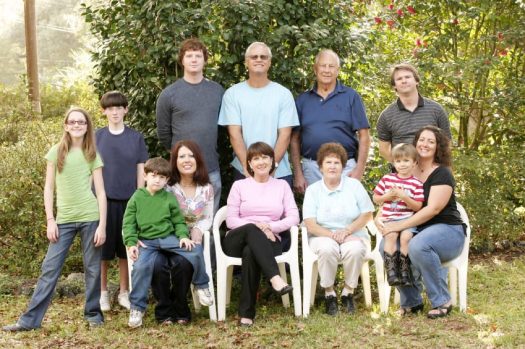Changing Family Relationships Blog Series
Written by: Mary Brintnall-Peterson, Ph.D., MBP Consulting, LLC, Professor Emeritus, UW-Extension & Caregiver
Family members typically provide support to cancer victims and are in it for the long haul. They do whatever is needed and often at the expense of their own health or needs. No matter how positive family relationships are before cancer the toll of the cancer journey can create relationship complications. This is the first article of a four-part series on changing family relationships. Relationships are influenced by an individual’s age, gender, the health of the caregiver or care receiver, and family rules. While exploring these influences and possible conflict areas think about your caregiving situation and determine if they are affecting your relationships.
Condition of Care Receiver
The cancer victim’s health and their reactions to cancer treatments determine what the caregiver needs to do. Besides dealing with the reactions to cancer treatments some care receivers have additional health concerns and/or disabilities that can complicate their care such as a heart condition, physical disabilities, cognitive impairment or another medical condition. Possible conflict areas:
- Difficult caregiving tasks are complex and need specialized assistance.
- Care requires specialized equipment or training which the caregiver doesn’t have.
- Care receiver wants care only to be done by the caregiver.
Health of Caregiver
It’s common knowledge that the health of the caregiver is affected while providing care, especially if the caregiver is female and they have provided care for an extended time. In some cases, caregiver’s experience depression which can complicate family relationships. Some family members may or may not understand depression and how it affects the individual and their ability to provide care. Often caregivers ignore the signs that they need medical attention because they feel they don’t have time to check them out or deal with them. Possible conflict areas:
- Caregiver health deteriorates
- Caregiver won’t turn some caregiving tasks over to others
- Caregiver’s lack of attention to their own health
Gender of Family Members
Males and females manage caregiving differently. Females typically focus on the emotions of the care receiver and check out how they feel about their treatments, their care or other challenges they encounter. Men on the other hand look at what task needs to be done and how can it be done. Dealing with personal care provides an example of the differences between males and females. A female caregiver worries about how the care receiver feels when someone they don’t know is bathing or toileting them while a male caregiver focuses on how can bathing and toileting be done efficiently. Men use a more active coping style while women use avoidance or emotional-focused copying styles. Women are more likely to have and use support networks such as other family members, friends or professional organizations or agencies. Men typically have higher incomes so hire assistance. So, in summary women focus on caregiving from a psychosocial perspective and men from a management perspective. Possible conflict areas:
- Lack of recognition of differences in how caregiving is viewed by different genders.
- Lack of communication about gender perspectives and differences in copying styles.
Role Differences
The role the caregiver has in the relationship with the care receiver determines how the caregiver handles the role. Spouses see their role as a wife, husband, or partner and not as a caregiver. They see providing care as part of their marriage contract or partnership agreement. They typically, don’t seek assistance and when they do its usually too late. Spouses or partners provide more intensive, demanding, intimate and personal care than other caregivers. They do not leave the caregiving role unless death occurs or their health interferes with their ability to provide care. They are at a greater risk of being isolated and lonely.
Adult children view caregiving as an added role on top of all their other roles as partner, parent, employee, etc. Adult children leave the caregiving role sooner than spouses, especially sons. Sons leave caregiving when personal care is needed. Daughters often hang in there and continue to provide assistance.
Parents who care for their adult children can have conflicts between being the parent and being the caregiver. Sometimes they are unable to completely stop being a parent. They have difficulty in finding the balance between the adult child’s need and desire for independence with their obligation to provide care, supervision and guidance. Parents experience losses of their expectations for their child, heartache of seeing him/her in pain and witnessing their adult child’s health deterioration. Possible conflict areas:
- Taking on more caregiver responsibilities than they are able to handle because they view caregiving as their spouse/partner obligation.
- Unwillingness of care receiver to take on, share or stop doing some caregiver tasks.
- Expectations of care receiver that their children will care for them regardless of their other responsibilities.
- Lack of recognition of where different roles start and end.
- Understanding that different roles have difference functions
- Getting stuck in old relationship roles.
- Not willing to recognize how the relationship is changing and need to change what they do.
Age
The age of the caregiver can influence what a caregiver can and can’t do. Older caregivers may have health and physical limitations which don’t allow them to provide physically demanding care such as lifting or moving the care receiver. There are also differences in communication methods with the younger generation using technology and older family members not having access to technology, don’t know how to use it and in some cases have no desire to use technology. The number and types of experiences a caregiver has can be related to their age and can be very unfamiliar to the care receiver. Possible conflict areas:
- Age related limitations
- Caregiver assumes tasks the care receiver is able to do or the caregiver thinks the care receiver can do more than they are able to do.
- Generational issues like how they view sharing of information, money, or making decisions.
- Use, reliance or desire to use technology
Did you identify factors that are affecting your relationship with other family members, your care receiver or caregiver? Recognizing how these factors influence your relationship is the first step in understanding how to address them and if needed make changes in how you perceive different aspects of your relationship. To gain additional insight into your relationships the second article of the four-part series on changing family relationships identifies reasons for family conflict. The third and fourth articles discuss strategies on ways to address family relationship conflicts.















